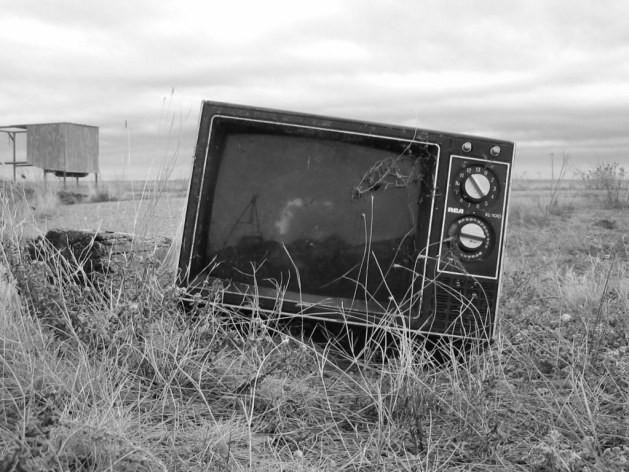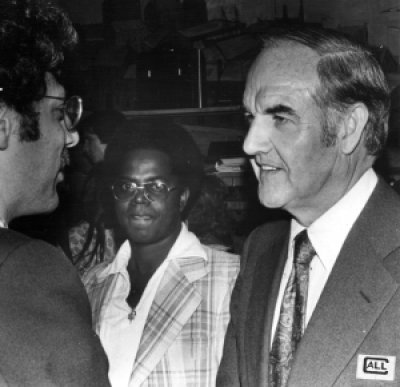
Photo (cc) 2004 by the autowitch
Previously published at GBH News.
At the heart of a bombshell report showing that AT&T nurtured and enriched the far-right One America News cable network is a larger, more ominous issue: a broken media system that forces all of us to subsidize content we don’t want — and that, in this case, is actually undermining democracy.
Last week Reuters uncorked the results of a massive investigation into the tangled relationship between the two companies. Reporter John Shiffman, delving deep into court records, showed that OAN’s 2013 launch came at AT&T’s instigation and that the telecom giant’s continuing patronage is responsible for some 90% of OAN’s revenues.
“They told us they wanted a conservative network,” OAN founder Robert Herring Sr. said of AT&T executives during a 2019 deposition. “They only had one, which was Fox News, and they had seven others on the other side. When they said that, I jumped to it and built one.”
OAN first came to prominence last fall, after Fox (briefly) refused to lend credence to Donald Trump’s claims of election fraud. OAN and another far-right cable net, Newsmax, soared in the ratings by embracing Trump’s falsehoods. Today both networks, along with Fox, have positioned themselves as firehoses of misinformation and disinformation about the election, the Jan. 6 insurrection and COVID-19.
At a time when the reach of even small media outlets can greatly exceed their core audience through amplification on Facebook and other social networks, what OAN tells its audience matters a great deal.
“OAN’s television reach may not be vast: Most Americans won’t encounter it when they turn on their TV,” writes Washington Post media columnist Margaret Sullivan. “But its website’s offerings very well may show up in their social media feeds.”
But why would a major corporation like AT&T subsidize a shady operation like OAN? After all, high-powered business executives tend to be conservative in the old-fashioned sense of the word — they don’t like taxes or regulations, but they do like stability. The second to last thing a company like AT&T wants is for a Confederate flag-waving mob to storm the Capitol. And the last thing it wants is to be associated with a media outlet that revels in such anarchy.
The answer may lie in our perverse cable television system, which forces us to pay for channels we don’t want and which in turn depends on favors from the government in order to keep the money spigot flowing.
According to Shiffman’s reporting, in 2014 AT&T was attempting to acquire the satellite service DirecTV, and its executives were concerned about whether they might run afoul of regulators. OAN and another network owned by the Herrings, WealthTV, were already running on U-verse, a smaller outlet that AT&T owned. So AT&T suggested that it run both channels on DirecTV as well.
By doing so, court documents suggest, AT&T could allay worries that the acquisition would make it more difficult for independent networks to be carried by major cable providers. The optics of reaching out to carry a conservative network may have been helpful even though Barack Obama was president at the time.
“What we seem to see here,” writes Josh Marshall at Talking Points Memo, “is that regardless of personal politics AT&T was operating in and expanding in one of the most regulatory-dependent industry spaces — telecom, cable TV, internet service, content — and they wanted more conservative programming because that helps get regulatory help.”
Now, it’s also true that AT&T is a fading player in the cable wars, and that OAN is carried by other providers. So it’s not necessarily a slam dunk that AT&T enabled OAN for the sole purpose of obtaining regulatory goodies from the FCC. But if Marshall’s theorizing is correct, then it’s a good illustration of how our media system works on behalf of giant corporations and against the rest of us.
There is a simple solution to this, which I’ve written about before: breaking the connection between cable services (and, in the case of DirecTV, satellite) and programming. Beyond basic local channels, require that cable companies offer additional channels on an à la carte basis. If you want the Food Channel but don’t want HGTV, you shouldn’t have to pay for both. You could pay only for the news channels you want as well.
Of course, all of this comes at a time when we can see that cable TV will eventually go away as more and more people cut the cord and get all their video programming through the internet. So the problem I describe is one that will eventually be solved on its own.
Yet technologies can take a long time to die. AM radio is still with us, as are print newspapers. Similarly, we may assume that cable TV will be with us for years to come, even as its audience shrinks and ages.
Given that, it makes sense to let us pay only for the channels we want. Such a move would be pro-consumer and pro-democracy. And it would remove incentives for corporations like AT&T to promote dangerous propaganda for the sole purpose of appeasing their regulatory overlords.






